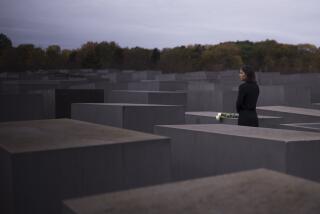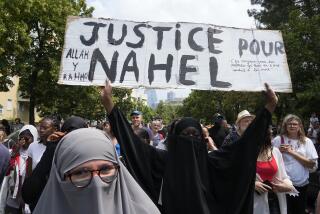Anxiety, Confusion Grip Arabs in W. Europe : Muslims: Most oppose military action against Iraq, but as many support President Bush as Saddam Hussein.
- Share via
PARIS — At first glance, it looked like life as usual one recent day on the Rue de la Goutte d’Or, heart of the Arab quarter in the French capital.
At the Medina Bakery, a man carefully ladled honey onto a stack of date-filled pastries called makrood.
Lamb shanks roasted on electric spits in front of Muslim butcher shops. Porters struggled under large bundles of fresh Moroccan mint.
As usual, the young, jobless men from Algiers and Tunis and Marrakech sat huddled in cafes over cups of strong, sweet coffee.
But behind the appearance of normalcy, the neighborhood called the “Quarter of the Drop of Gold”--like dozens of other Arab enclaves in France and Western Europe--was gripped with anxiety and confusion caused by the Gulf War.
Nearly every cafe and couscous parlor had a television set or a radio tuned to news broadcasts. Older men studied bellicose headlines in Arabic newspapers imported from North Africa. A few young men boasted about the military might of Iraqi President Saddam Hussein.
“Saddam Hussein is a great man,” said Omar Nadizi, 20, an unemployed welder from Algeria. “He is fighting a war for the liberation of Palestine.”
His friend, Nadji Mon Brini, 30, an unemployed Algerian house painter, declared himself a pacifist as he sipped coffee at the Medina Bakery. “It is easier to make war with your tongue,” he said, pointing inside his mouth and looking at his younger friend, “than it is with a gun.”
The debate in the bakery reflected the way the Gulf War has divided the large Arab population here.
Recent opinion polls, the first surveys of European Arabs since the war began, show that a majority favor neither Hussein nor President Bush, although most strongly oppose the allied military campaign against Iraq.
The polls supported what European Arab sociologists have been saying all along: The European Arab community is not a monolithic political entity to be feared as an alien force inside Europe. For example, two recent polls in France showed that nearly 40% of this country’s large Arab population supports the policy of the government, which has engaged troops and aircraft in the conflict alongside the United States and other allies.
The question is critical because more than 4 million Arabs, mostly from North Africa, live in France. Perhaps 2 million more live in other European countries, with important concentrations in Belgium, Spain and Italy.
European politicians--especially anti-immigrant leaders of the extreme right wing such as France’s Jean-Marie Le Pen--have tended to portray European Arabs as a potentially powerful, unified political force, tied by Islam and language to a greater Arab nation.
“Like it or not,” French Arab civil rights leader Arezki Dahmani commented, “the Maghrebians (North African Arabs) were suspected of having ‘double allegiance’ and accused of being members of a ‘fifth column’ manipulated from abroad. No matter what they thought, they were classed as being fundamentalist and anti-democratic.”
From the outbreak of the Gulf crisis in August, a nightmare political scenario in France and elsewhere in Europe has been that Arab residents would take sides with Hussein.
Fears of an alienated Arab mass in the heart of the European Community has been cited as a reason for the hesitation by some governments--notably Belgium, Italy and Spain--to take part militarily in the 29-nation coalition formed against Iraq.
But a series of recent opinion polls taken inside Arab and other Muslim communities challenged conventional assumptions about Western Europe’s large Islamic population.
The polls, including two surveys in France within 10 days after the outbreak of war, showed that only a minority of Muslims supported Hussein. The polls were conducted Jan. 24-26 by the Institut Francais de L’Opinion Publique (Ifop) for Le Figaro newspaper and Jan. 24-25 by Societe Francaise d’Enquetes par Sondages (Sofres) for L’Express magazine and a state-owned television network.
The survey by Sofres showed that 21% of the Muslim community--mostly Arabs--had a generally favorable attitude toward the actions of Hussein in the Gulf. But, surprisingly, President Bush received an almost equally favorable rating of 20%.
Especially reassuring to the French, the surveys showed that a significant portion of the Muslims (37% in Ifop’s poll, 42% in that of Sofres) supported French policy in the Gulf. This is important because France, with 12,000 troops in Saudi Arabia, is the third-largest Western military force, behind the United States and Britain, fighting Iraq.
In Belgium, home to an estimated 155,000 North African Arabs, support for the government was even higher. A poll for the weekly magazine L’Instant reported 61% of Belgium’s Arabs approved the government’s policy, which was not to take part directly in the fighting but to give behind-the-lines support to the allies.
To the relief of uneasy European leaders, there is no evidence that Arabs and other Muslims on the Continent have been aroused by Hussein’s call for worldwide Islamic holy war against the United States and its allies or excessively swayed by his purported concern for the Palestinian cause.
“The first good news since the beginning of the war,” wrote rightist French newspaper columnist Thierry Desjardins in Le Figaro, “ . . . Hussein cannot count on a ‘fifth column’ in France. His call for a holy war was not heard.”
Also, the polls provided new evidence that young Arabs born in France are less interested in fundamentalist ideology and Arab causes than they are in getting jobs and integrating into European society.
“The polls show two things,” said Adil Jazouli, a Morocco-born French sociologist who is a specialist in suburban Arab communities. “First, the Muslim community put Saddam Hussein and George Bush on nearly the same level.
“Secondly, in contrast to the majority opinion in France, the biggest part of the Muslims oppose the military option. They take this position to demonstrate their solidarity as Arabs but even more because they fear the war will hurt their integration into Europe. The fear of negative consequences of this war on their integration is their principal preoccupation.”
According to the Ifop poll, based on 572 face-to-face interviews in Muslim homes in France, 58% of those interviewed said they were “concerned” about their future as a result of the war. According to the Sofres poll, a telephone survey of 500 families, 44% of those interviewed predicted “serious consequences” for European Muslims as a result of the war. Both polls reported that Muslims felt greater hostility directed toward them as a result of the war.
Shopkeepers in the Goutte d’Or neighborhood said police patrols have sharply increased. In one controversial move, plainclothesmen raided music shops and confiscated thousands of cassette tapes entitled “Go on Saddam” recorded by popular Algerian singer Mazouni.
The song begs the Iraqi leader to hold on against the attacks of the “American GIs working for the kings of oil.”
Young Arab immigrants, in particular, complain of increased harassment by police under wartime security measures, including surprise searches and identification checks.
“Before this war,” said Nadizi, one of the young men drinking coffee at the Medina Bakery the other day, “France was not as severe about illegal immigrants as it is now. I don’t have my papers. But everybody knew I was clandestine, and they never did anything about it until now. Now, they stop everyone who has black hair and demand their papers.”
“Today, there is a war between Iraq and the United States,” agreed his friend Brini, “but it is the Arabs here in France who are suffering for it.”
More to Read
Sign up for Essential California
The most important California stories and recommendations in your inbox every morning.
You may occasionally receive promotional content from the Los Angeles Times.













